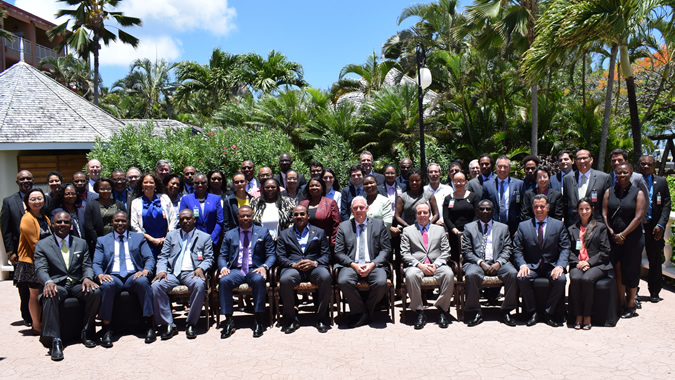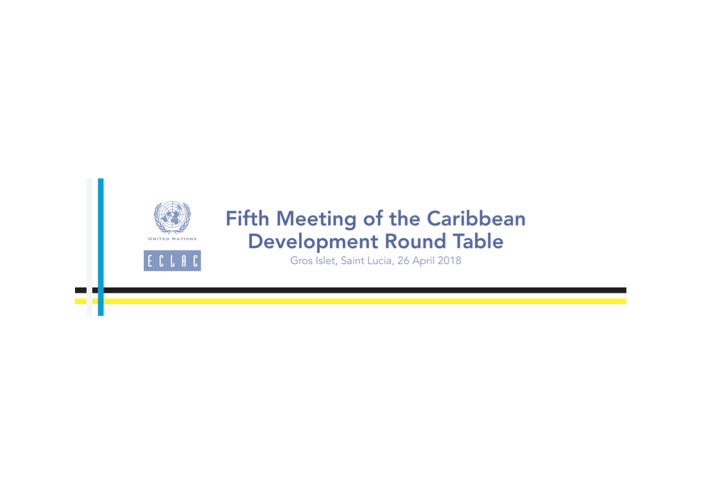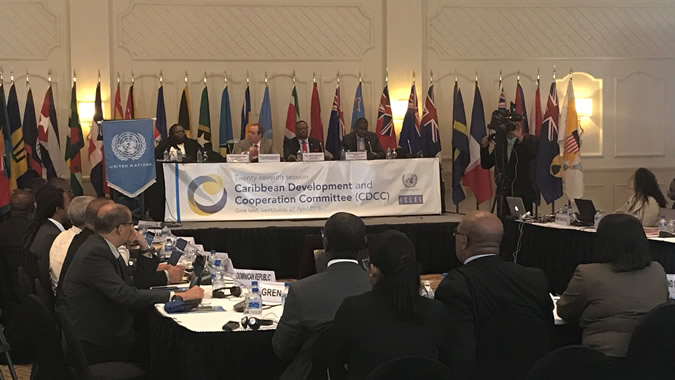Caribbean Development Roundtable Brings Together Ministers to Discuss Economic Growth and Climate Resilience
Work area(s)
The meeting convened by ECLAC and hosted by the Government of Saint Lucia, took place today in Gros Islet.

Climate resilience through green investment, the impact of de-risking and the promotion of sustainable economic growth were the center of focus at the fifth Caribbean Development Roundtable (CDR). Decision makers, senior policy makers and ministers addressed these pivotal topics over the course of a fruitful day of discussions, which took place today (26 April 2018) in Gros Islet, Saint Lucia.
Convened by the Economic Commission of the Caribbean (ECLAC) subregional headquarters for the Caribbean, and hosted by the Government of Saint Lucia, the CDR was officially opened by Mr. Raúl García-Buchaca, the Deputy Executive Secretary of ECLAC for Management and Programme Analysis, and The Honourable Allen Michael Chastanet, Prime Minister of Saint Lucia, Minister for Finance, Economic Growth, Job Creation, External Affairs and the Public Service.
In his opening statement, Chastanet underscored the timeliness of the meeting and the importance of the issues to be discussed by emphasizing that “The Caribbean has ten of the most indebted middle-income countries in the world”
Echoing the sentiments expressed by Chastanet, García-Buchaca highlighted that the Caribbean debt burden is one of the major challenges currently facing the sub-region. “The debt in many of the [Caribbean] countries is today above sustainable benchmarks”, García-Buchaca stated. In this regard, García-Buchaca went on to outline the main differences between past remedial efforts – which have not achieved the desired results – and the ECLAC approach to debt reduction, most notably vis-à-vis the incorporation of a resilience building component, as well as the requirement for member states that elect to participate in such a debt for climate swap arrangement to pursue structural reforms. Furthermore, García-Buchaca explained that ECLAC has already formed a multi-organizational Task Force to move ahead with the proposal. Composed by representatives from Antigua and Barbuda, Saint Lucia, and Saint Vincent and the Grenadines, the Task Force has already met twice, in November 2017 and February 2018.
However, even as the Caribbean continues to grapple with its huge debt crisis, the sub-region finds itself facing a new economic and financial threat. Commonly known as ‘de-risking’, this latest challenge consists in the loss of correspondent banking services (CBSs) and correspondent banking relationships (CBRs). Prime Minister of Antigua, the honorable Gaston Browne, highlighted the intrinsic challenges caused by de-risking to Caribbean economies. In particular, Browne noted that, “The most effective mechanism to fight Anti-Money Laundering and Countering Financing of Terrorism is full global cooperation among all states, not de-risking.”.
Recognizing the need for urgent action, Coordinator of the Economic Development Unit at ECLAC’s Port of Spain office, Mr. Sheldon McLean, presented the main short and long-term recommendations emerging from ECLAC’s latest study on the ‘de-risking’ challenge. “A disruption in correspondent banking relationships (CBRs) precipitates a financial shock which potentially can destabilize affected economies”, McLean stated.
In addition to the above, through panel presentations and dialogue among policy makers, academics, the private sector and other stakeholders, the CDR also considered other major issues facing the sub-region, including opportunities for financing green investment for resilience building and structural transformation, and the need to promote fiscal responsibility and financial management through for the use of public expenditure reviews (PERs).
Held every two years, the CDR provides a space for intellectual exchange and suggestions, with a view to identifying workable solutions to address the vulnerabilities of Caribbean small island developing states (SIDS).
For further information, please contact Alexander Voccia at alexander.voccia@eclac.org or Denise Balgobin at denise.balgobin@eclac.org. Telephone: (868) 224-8067/224-8075.
Related content

Fifth meeting of the Caribbean Development Roundtable
This year the Caribbean Development Roundtable (CDR) takes a frontal look at four major issues facing the region with a view to identifying workable solutions to address them successfully.

Caribbean Ministers Celebrate ECLAC 70th Anniversary with Focus on Holistic Approach to Development
The twenty-seventh session of the Caribbean Development and Cooperation Committee (CDCC) took place in Saint Lucia today and brought together senior decision makers from across the Caribbean.
Subregional headquarter(s) and office(s)
Related link(s)
Country(ies)
- Caribbean
-
Saint Lucia
Contact
Alexander Voccia
- alexander.voccia@eclac.org
- 868 224 8067
